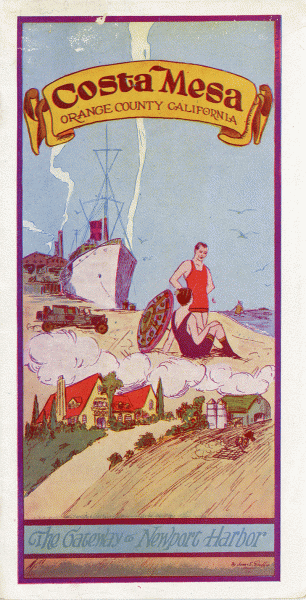Costa Mesa “The Gateway to Newport Harbor”

Jill Thrasher, Librarian
In 1999, Costa Mesa changed its city slogan from “The Hub of the Harbor” to “The City of the Arts.” It is home to Segerstrom Center for the Arts, South Coast Repertory theater and South Coast Plaza, one of the nation’s most successful shopping centers. Yet, Costa Mesa was not always known for these attractions. . .
In 1926, Costa Mesa’s Chamber of Commerce wanted to entice people to move to Costa Mesa so, like many other cities, they created a city brochure to entice people to live and work in their community. It tagged Costa Mesa as “The Gateway to Newport Harbor,” and offered, “a sincere welcome to those who [were] seeking health, happiness and prosperity.” The brochure highlighted business opportunities, rich agriculture and distinct attractions that could only be found in Costa Mesa.
One of the first unique attractions mentioned is Costa Mesa’s “unusually clear radio reception.” Apparently the Pacific Coast broadcasting stations had the best technology in the country and “any variety of program [could] be picked up from stations all over the country.” What a sales pitch for at home entertainment!
Costa Mesa was also touted as having the best climate with no temperature extremes. Within a mile of Costa Mesa, residents and visitors could find themselves at the beautiful “land locked Newport Bay,” where they could enjoy water sports and good fishing all year long. When they returned from a day at the beach, they would enjoy the picture-perfect Costa Mesa climate, free of any marine layer.

Furthermore, the brochure baits readers by reminding them of Costa Mesa’s rich soil for small farms and gardens. With a semi-tropical climate, Costa Mesa could grow “oranges and other citrus fruits, apples, peaches, avocados, apricots, vegetables, corn, melons, grapes and berries.” With thousands of visitors coming to the beach, selling fresh fruits and vegetables was a gainful profit for Costa Mesa residents!
With the beach, clear radio reception, and fresh produce, visitors would need an affordable place to stay. Costa Mesa’s “Ideal Auto Camp” was the solution. It had all the modern luxuries, allowing guests to visit Costa Mesa’s many attractions without breaking their budget.
See the entire publication on the Sherman Library Digital Catalog.


